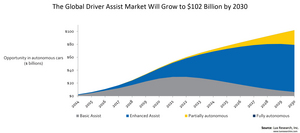BOSTON, MA--(Marketwired - Apr 28, 2015) - Advanced driver-assist systems (ADAS) will have a $102 billion opportunity by 2030, up from a mere $2.4 billion today, as carmakers rush to add automation features, according to Lux Research. Sensors will account for 23% of the opportunity, while the connectivity and apps segment takes a higher 28% share; software to coordinate sensor fusion and enable critical safety operations will claim a 25% share.
"ADAS technologies open the automotive market opportunity to new players from the software and hardware worlds, with each aiming to create as much value as possible by consolidating capabilities and offering platforms that enable 'plug-and-play' autonomy," said Maryanna Saenko, Lux Research Analyst and the lead author of the report titled, "The $102 Billion Opportunity for Partial Automation for Cars."
"While classic automotive manufacturers and suppliers will remain central to this emerging market, wildcard companies like Uber, Google and Apple could create new mobility platforms," she added.
Lux Research analysts evaluated the pace of automation in cars, and the opportunities it brings to automakers and tier-one manufacturers. Among their findings:
- Enhanced driver-assist segment has the best opportunity. Cars with basic driver-assist features, like parking assist, will cash in early, with a potential $29.6 billion market by 2022. However, enhanced driver-assist features such as adaptive cruise control and lane merge offers the largest opportunity to automakers and tier-one manufacturers -- worth $73 billion in 2030.
- True full autonomy won't arrive by 2030. Partial autonomy features -- like self-driving on the highway -- will be slow to roll out over the next 10 years, before growing to a $22.7 billion opportunity by 2030. In the most likely case, fully autonomous cars will not hit the market before 2030, largely because of regulations and a current lack of prototypes.
- Automation will add to cost. Enhanced driver-assist features will add $527 to the price of new cars in 2020, and a lower $481 per car in 2030. The bulk of the additional cost arises from software -- $367 in 2020, and $220 per car in 2030 -- while connectivity will account for $160 per car in 2020 and $261 in 2030.
The report, titled "The $102 Billion Opportunity for Partial Automation for Cars," is part of the Lux Research Autonomous Systems 2.0 Intelligence service.
About Lux Research
Lux Research provides strategic advice and ongoing intelligence for emerging technologies. Leaders in business, finance and government rely on us to help them make informed strategic decisions. Through our unique research approach focused on primary research and our extensive global network, we deliver insight, connections and competitive advantage to our clients. Visit www.luxresearchinc.com for more information.
Contact Information:
Contact:
Carole Jacques
Lux Research, Inc.
617-502-5314
carole.jacques@luxresearchinc.com
